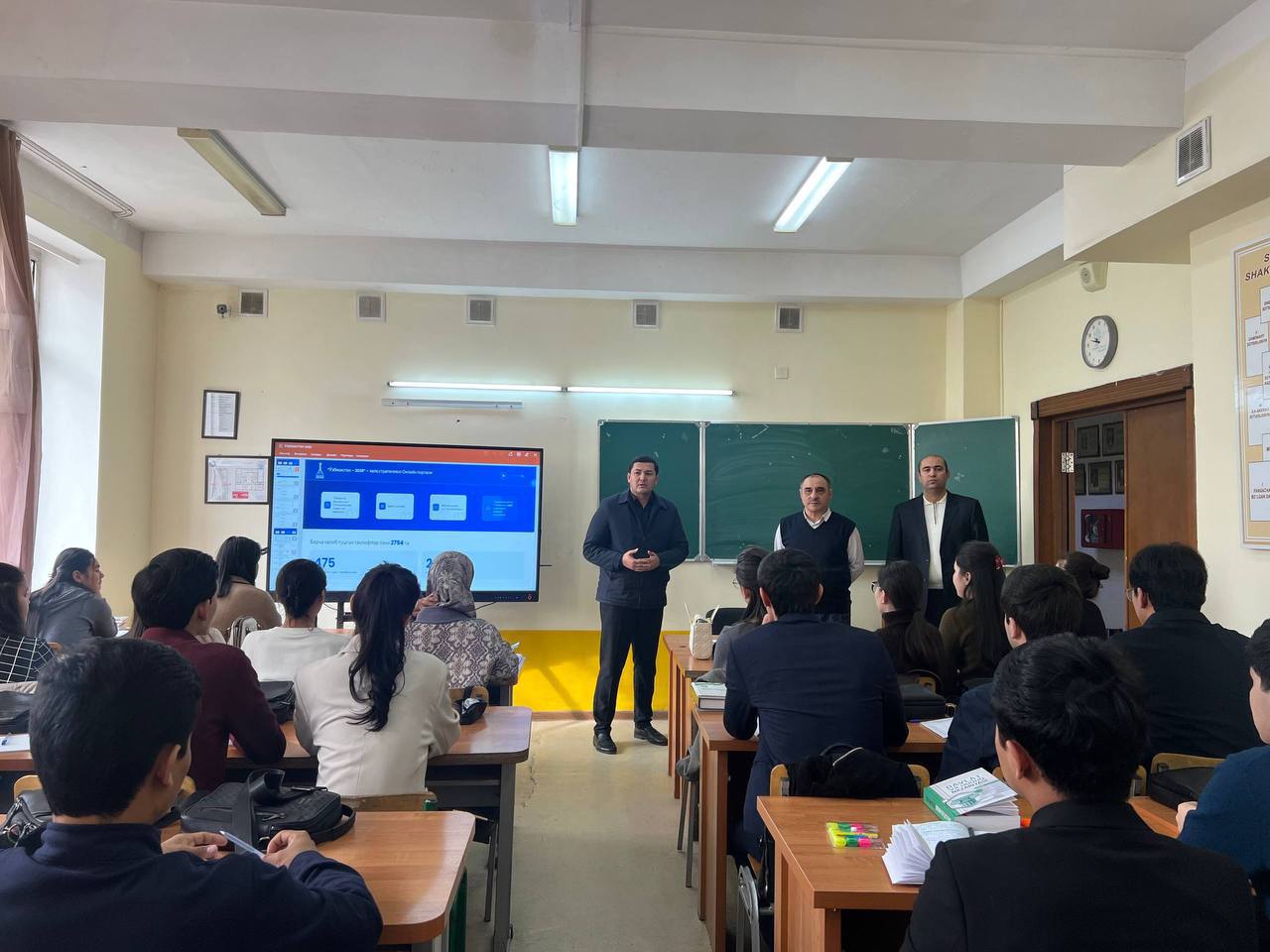
Mamaraximov Oybek – Head of department
100174, Universitet street 4, Olmazor district, Tashkent
Monday-Friday, 14:00 – 17:00
99 419-63-74
Oybekmamarahimov74@jmail.com
Department of “Ecological Monitoring”– It was created in 2020 on the initiative of the President of the Republic of Uzbekistan.
Scientific topics of the department:
– Rational use of environmental objects and restoration of biological resources.
– Improvement of the environmental protection and environmental monitoring system.
– Rational use of natural resources and development of waste-free and low-waste technologies in production, as well as technologies for processing waste from mining and processing enterprises.
Staff of the department
| № | |
| 1 | Mamarakhimov Oybek Muratovich Head of the department. Candidate of Biological Sciences. Tel: +998 99 419 63 74 E-mail: Oybekmamarahimov74@jmail.com |
| 2 | Nabiyev Utkir Abdukhalilovich Docent, candidate of Biological Sciences. Tel: +99893 536 42 00 E-mail: nabiev47@list.ru |
| 3 | Turaboev Akmal Normuminovich Acting professor, Doctor of Biological Sciences. Tel: +998 97 434 66 72 E-mail: akmal_tura1973@mail.ru |
| 4 | Kamalova Manzura Djamalovna Acting associate professor, Candidate of Biological Sciences. Tel: +998 91 163 51 01 E-mail: kamalova_manzura@mail.ru |
| 5 | Atabaeva Nargiza Karimovna Docent, Candidate of Biological Sciences. Tel: +998 93 585 00 03 E-mail: atabaeva_nargis@inbox.ru |
| 6 | Azizov Azamat Ataqo’ziyevich Acting associate professor, Candidate of Chemical Sciences Tel: +99893 570 27 52 E-mail:azazizov@rambler.ru |
| 7 | Eshmurodova Nargiza Sharofovna Docent, Candidate of Biological Sciences Tel:+ 99893 583 18 09 E-mail:nargizaeshmurodova0306@gmail.com |
| 8 | Akinshina Natalya Gennadievna Acting associate professor, Candidate of Biological Sciences Tel:+ 99890 932 52 98 E-mail:n.akinshina@yahoo.com |
| 9 | Ziyadov Shukurullo Rakhmatulloevich Teacher Tel:+998 90 902 82 51 E-mail:shukurilloziyadov@gmail.com |
| 10 | Rasulova Marguba Ilkhamovna Professor, Doctor of Medical Sciences Tel: +99893 398 40 80 E-mail:marg’uba63@mail.ru |
| 11 | Azimova Dilbar Ortikovna Docent, Candidate of Biological Sciences Tel: +99899 044 73 37 E-mail: dilbarazimova62@mail.ru |
| 12 | Okhunov Ravshan Zafarovich Senior Lecturer Tel: +99890 315 29 52 E-mail: r.ohunov@nuu.uz |
| 13 | Rustamova Rano Parpievna Senior Lecturer Tel: +99893 171 70 10 E-mail: r.rustamova@nuu.uz |
| 14 | Ismoilova Arofat Mirzokhidovna Teacher Tel: +99893 527 77 38 E-mail: a.ismoilova@nuu.uz |
| 15 | Shadenov Risbek Isabekovich Teacher Tel: +99893 379 02 28 E-mail: r.shadenov@nuu.uz |
| 16 | Khodjaev Azizjon Sotvoldievich Teacher Tel: +99897 714 85 97 E-mail: a.xodjaev@nuu.uz |
| 17 | Parmanova Nigina Atabaevna Senior Lecturer Tel: +99893 534 35 09 E-mail: intizor620@gmail.ru |
| 18 | Boymuratova Nilufar Ulugbek qizi Teacher Tel:+99897 888 99 89 E-mail: nilufar.boymurotova@mail.ru |
Subjects taught
| № | Name of the science | Brief information about science |
| 1 | Fundaments of ecology | To give students knowledge about the influence of environmental factors on living organisms, about organisms in a team, about the general patterns of their interaction with the environment, about the structure and dynamics of communities, about the laws and principles that determine the life of ecosystems |
| 2 | Biogeography | Formation of students’ theoretical foundations, basic concepts and patterns of biogeographic knowledge, identification of the biological and ecological role of organisms in the geographical envelope and its various territorial units, principles of distribution and habitat features of organisms based on the general geographical laws of the earth, as well as skills of their application in practice. |
| 3 | Bioecology (plant ecology) | The science of bioecology (plant ecology) studies the classification of environmental factors, their impact on plants, the problems of this science, the relationship between the environment surrounding the plant world, the influence of various environmental factors on plants and adaptations to them, the influence of anthropogenic factors and adaptations to them, plant protection, species listed in the Red Book, their classification, plant resistance to drought, salinity, etc., it is aimed at the formation and development of scientific and practical skills of adaptation to heat and other environmental factors. |
| 4 | Bioecology (Animal Ecology) | The science of bioecology (animal ecology) is a classification of environmental factors, their impact on animals, the problems of this science, the relationship between the environment of the animal world, the influence of various environmental factors on animals and their adaptations, the influence of anthropogenic factors on them and is focused on the formation and development of scientific and practical skills for adaptation, protection of animals, species listed in the Red Book, their classification, adaptation of animals to drought, salinity, heat and other environmental factors. |
| 5 | Soil and agroecology | The subject, goals and objectives of soil science and agroecology, scientific foundations, history of development, main sections, the relationship of science with other sciences; the role of science in solving modern problems in agriculture, the formation of cultural agricultural landscapes as a result of human activity on the soil cover and the introduction of achievements of agronomic science in agriculture in rural areas, which contributes to the formation of ecological relations between agrocenoses, thereby forming the skills of their practical application. |
| 6 | Social ecology | Social ecology – teaches legal regulation of public relations and environmentally sustainable development, legal regulation of public relations between nature and society, which occurs in the process of environmental protection, rational use of natural resources and restoration of degraded natural complexes. |
| 7 | Modern environmental problems | Science is the theoretical basis of modern environmental problems, basic concepts and laws, the current state of human impact on nature, the causes of today’s scientific and technological revolution and global environmental crises, as well as the application of knowledge on nature conservation, the current environmental crisis, local negative environmental consequences, teaches the laws of climate change, potential environmental hazards, environmental legislation, theoretical foundations of environmental problems. |
| 8 | Biosafety of food products | The science of food and biosafety includes a healthy human lifestyle, the role of environmentally friendly natural foods, their chemical composition, biosafety measures in agricultural production and the importance of using modern methods to ensure the biosafety of food. microbiological characteristics, methods of food quality control and ensuring biological safety in the production process. |
| 9 | Environmental policy | The science of environmental policy Introduction to the current environmental policy in Uzbekistan, the content of rational use and protection of nature, reflection of environmental law, the study of environmental law in the development of environmental consciousness and culture of the local population, tactical plans and strategic programs and familiarization with plans, disclosure of the theoretical foundations of environmental policy; teaches the mechanism of interpretation and legal disclosure of the system of environmental legislation, the formation of ecological and legal worldview and culture, the application of environmental legislation in practice. |
| 10 | Climate change and environmental adaptation | The science of climate change and environmental adaptation Scientific and theoretical foundations of climate and climate change, environmental problems related to climate and their causes, their change in space and time, environmental assessment, nature conservation and environmental foundations of rational use of natural resources. |
| 11 | Ecomonitoring and ecoexpertiza | Ecomonitoring and eco-expertise Types and levels of ecomonitoring and eco-expertise, organization and conduct of environmental expertise of the natural environment and ecosystems, fundamentals of biological monitoring, monitoring of biosphere reserves, environmental expertise of new and existing equipment and technologies; inventory of waste; environmental impact assessment of the enterprise; teaches methods of selecting and justifying options for environmental protection measures, calculating the maximum allowable amount of waste, placement and disposal of industrial waste. |
| 12 | Urban and industrial ecology | To give a general idea of the science of urban and industrial ecology, ecological design of dwellings, environmental monitoring of cities, the study of urbanization processes and their consequences; improvement of the ecological state of urban air; access to clean drinking water, industrial waste and their processing; teaches industrial cities environmentally sustainable development. |
| 13 | Garbology and ecotoxicology | Science of garbology and ecotaxicology – these are the search for safe methods of waste disposal, the detection of harmful substances, waste requiring special treatment, finding reliable information about the composition of waste and ways to eliminate it, the study of factors of anthropogenic environmental changes, forecasting and assessment of environmental consequences, the development and improvement of waste disposal methods, environmental safety, theoretical and practical assessment of the use of environmental, social and other waste to ensure sustainable urban development, with the basics of forecasting, the introduction and implementation of waste recycling technologies, the identification of toxicity and risk (the ratio of quantity and quality), the prevention of dangerous situations, the development of measures to restore ecosystems, the relationship between environmental factors and systems, the biosphere that preserves the place and the human gene pool teaches questions. |
| 14 | Methods of teaching ecology | Methods of teaching environmental sciences History and scientific foundations of science, methods and means of environmental education as a future teacher, new pedagogical technologies that can be used in the educational process, as well as interactive environmental methods to be able to apply teaching in practice to give independent knowledge; Taking into account the specifics of working with curricula, textbooks, textbooks created on the basis of the SNT, and their practical implementation, the organization of teaching environmental sciences in schools, lyceums and secondary specialized vocational educational institutions provides scientific knowledge, practical training and skills for implementation, teaching methods. , application of tools. |
| 15 | Rational use of natural resources and alternative energy | The science of rational use of natural resources and alternative energy provides students with theoretical foundations and practical issues of rational use of natural resources, as well as providing and improving the necessary human habitat, alternative sources and sources of energy, environmentally friendly and renewable. provides scientific and practical knowledge and skills on the use of energy resources. |

